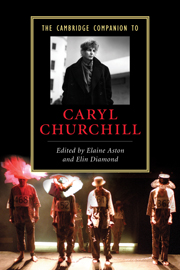Book contents
- Frontmatter
- 1 Introduction: on Caryl Churchill
- 2 On feminist and sexual politics
- 3 On owning and owing: Caryl Churchill and the nightmare of capital
- 4 On the challenge of revolution
- 5 On text and dance: new questions and new forms
- 6 On Caryl Churchill’s ecological drama: right to poison the wasps?
- 7 On performance and selfhood in Caryl Churchill
- 8 On Churchill and terror
- 9 On collaboration: ‘not ordinary, not safe’
- 10 On Churchill’s influences
- Select bibliography
- Index
9 - On collaboration: ‘not ordinary, not safe’
Published online by Cambridge University Press: 28 March 2010
- Frontmatter
- 1 Introduction: on Caryl Churchill
- 2 On feminist and sexual politics
- 3 On owning and owing: Caryl Churchill and the nightmare of capital
- 4 On the challenge of revolution
- 5 On text and dance: new questions and new forms
- 6 On Caryl Churchill’s ecological drama: right to poison the wasps?
- 7 On performance and selfhood in Caryl Churchill
- 8 On Churchill and terror
- 9 On collaboration: ‘not ordinary, not safe’
- 10 On Churchill’s influences
- Select bibliography
- Index
Summary
One of the defining characteristics of Caryl Churchill's theatre is her desire to work in collaboration with other artists. This is not to say - and it is important to note this at the outset of this collaboration-focused contribution to the Companion - that Churchill does not also write by herself. Nevertheless, her reputation for working with practitioners from theatre and other arts-related media is second to none among contemporary British dramatists. In this chapter I aim to detail some of the many ways in which collaboration is important to Churchill's writing: exploring the collaborative choices she has made, the practitioners and contexts this has involved her working with and in over the years, and how these relate to her dramaturgy, aesthetics and politics. To this end, I am adopting a different strategy to the academic's customary outside-in view of plays analysed for their critical, cultural, theatrical or social significance (as evidenced in other of our Companion chapters). Instead, given my focus, I am approaching her work from the inside-out: taking collaborative process as a route through to an understanding of Churchill's theatre as 'not ordinary, not safe'. / Finding an artistic community / As both our Chronology and Introduction record, Churchill spent her early writing years working mainly on radio drama which she was drawn to as the medium she enjoyed and grew up with; one which she acknowledges as being more important to her than television which was around at the end of her childhood.
- Type
- Chapter
- Information
- The Cambridge Companion to Caryl Churchill , pp. 144 - 162Publisher: Cambridge University PressPrint publication year: 2009
- 1
- Cited by



